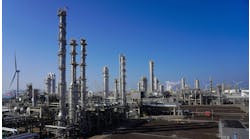In the wake of the East Palestine, Ohio, chemical spill, the American Chemistry Council highlighted several policy changes the association says could improve chemical safety. One of those changes includes rules to protect chemical facilities from drone threats.
ACC issued the statement just days after several news outlets reported the arrest of two men for flying drones over chemical facilities near New Orleans.
ACC reiterated a previous request that the Federal Aviation Administration (FAA) adopt a framework to safeguard critical infrastructure against drone threats. This includes allowing operators and owners of critical infrastructure facilities (and others designated as “fixed site”) to apply for airspace restrictions or prohibitions to prevent drones from operating adjacent to their facilities.
The St. Charles Parish Sheriff’s Office responded to a call on Feb. 21 that a drone was flying over the Dow Inc. facility in Taft, Louisiana. A detective on the scene observed two men sitting in a black SUV parked on the side of the road, one wearing virtual reality (VR) goggles and the other holding a controller, according to a sheriff’s report. Police arrested Volodymyr Dorogobid, 38, and Tigran Avetisyan, 39, both of Brooklyn, N.Y., and charged each with obstruction of justice charge and three counts of unlawful use of an unmanned aircraft system (UAS).
Detective Greg Oehldrich observed the drone flying over three separate chemical companies – Dow, Linde and American Air Liquide, according to the report. He also saw a black bag, a drone controller, VR goggles, a computer case and several suitcases in the hatchback area of the vehicle. When interviewed by detectives, Dorogobid said Avetisyan was using VR goggles to assist him in flying the drone. Dorogobid said when he landed the drone, he and Avetisyan hid the aircraft in a field, the report states.
While some news reports have stated the men were filmmakers, the St. Charles Parish Sheriff’s Office said the incident is still under investigation.
“We seized their equipment and are working with the FBI to recover information and further the investigation,” said Amanda Pertuis, public information officer for the St. Charles Parish Sheriff’s Office, in an email to Chemical Processing.
ACC, along with several other organizations representing critical infrastructure facilities, signed a letter addressed to President Biden on March 29, 2022, requesting that the FAA fulfill its obligation to enact drone flight restrictions over safety-sensitive facilities, as Congress required under the FAA Reauthorization Act of 2018.
“It’s crucial that we protect critical infrastructure facilities and other sensitive sites from potential safety and security risks posed by a UAS,” ACC wrote in a March 3 blog post. “ACC is calling on the Federal Aviation Administration (FAA) to fulfill its Congressional requirement to adopt rules to protect critical infrastructure, including chemical facilities from drone threats.”
More than 860,000 commercial and recreational UAS are registered in the United States, ACC notes. Drones may be useful in some chemical industry applications, including for use as cost-effective and safe ways to rapidly gather imagery of out-of-reach spaces and large geographic areas, as Chemical Processing previously reported.
For example, Shell uses a drone at its Pennsylvania Petrochemicals Complex to take construction progress snapshots of its $6 billion project to make polyethylene from shale-gas-derived ethane. The company also uses drones at its Deer Park refinery in Texas, where drones inspect a tank farm to collect data instead of having technicians physically visit the tanks.


